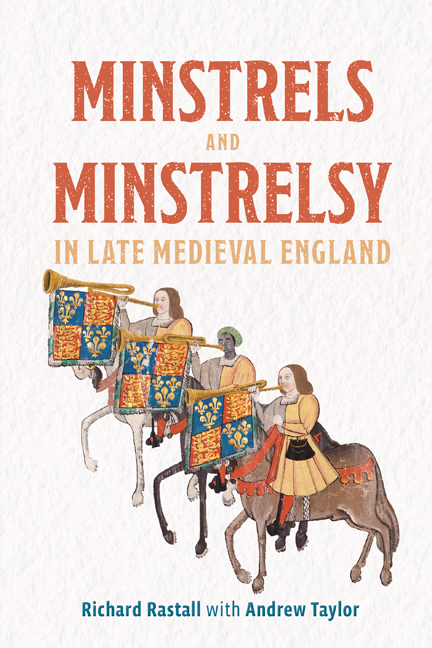Book contents
- Frontmatter
- Dedication
- Contents
- List of illustrations
- List of music examples
- List of abbreviations
- A note on references
- A note on money
- A note on dates
- Preface
- Acknowledgments
- Part I Minstrels and Minstrelsy in the Elite Households
- Part II Urban Minstrelsy
- Part III On the Road
- Part IV Minstrel Performance
- Envoi
- Bibliography
- Index
Part III - On the Road
Published online by Cambridge University Press: 09 January 2024
- Frontmatter
- Dedication
- Contents
- List of illustrations
- List of music examples
- List of abbreviations
- A note on references
- A note on money
- A note on dates
- Preface
- Acknowledgments
- Part I Minstrels and Minstrelsy in the Elite Households
- Part II Urban Minstrelsy
- Part III On the Road
- Part IV Minstrel Performance
- Envoi
- Bibliography
- Index
Summary
Introduction to Part III
Although we must reject the romantic concept of the wandering minstrel, it is true that minstrels travelled frequently and in many cases long distances. Liveried household minstrels were often in the company of their employers, who travelled widely between their own properties and on military or political business. Chapter 8 examines two specific cases in which minstrels accompanied a princess going to her wedding, examples of a temporary household travelling a considerable distance. These are an uncommon occurrence, but they shed light on the circumstances surrounding the journey of a noble and her household, and by implication give some information about the planning of such an event.
Planning must certainly have been an important element in minstrel travel, whatever the circumstances. Even when liveried household minstrels took to the road independently (Chapter 9) it was along pre-planned routes, on a time-bounded itinerary, and with the specific purpose of obtaining financial reward as efficiently as possible. Independent minstrels almost certainly travelled much shorter distances, for in general they had no need to do otherwise: their financial rewards tended to be local, and attending events further away carried the risk of earning too little to make it worthwhile. For them too, travelling haphazardly and arriving at a venue unexpectedly was poor practice and unlikely to be rewarded. Minstrels, like anyone else, were entirely serious about earning a living.
Only one type of occasion made it financially sensible for a minstrel to travel to a venue ‘on spec’: fairs. There the potential rewards were considerable and available to all, depending only on the minstrel's ability to entertain. For this purpose, it was worthwhile for an independent minstrel to travel rather further than usual. This meant that for several days, while the fair continued, there would be both known and unknown entertainers present, making what money they could. It was a situation where criminals would be active, particularly pickpockets and cut-purses but also charlatans posing as entertainers, and it demanded some regulation (Chapter 10). In the first place this was provided by the owner of the land (or of the fair, if different). While some policing was necessary to keep order at the fair, eventually exercised through minstrel-courts, most of the evidence for this control arose because of financial arrangements: landowners exacted fees from minstrels and others in return for licence to perform or trade.
- Type
- Chapter
- Information
- Minstrels and Minstrelsy in Late Medieval England , pp. 163 - 166Publisher: Boydell & BrewerPrint publication year: 2023



